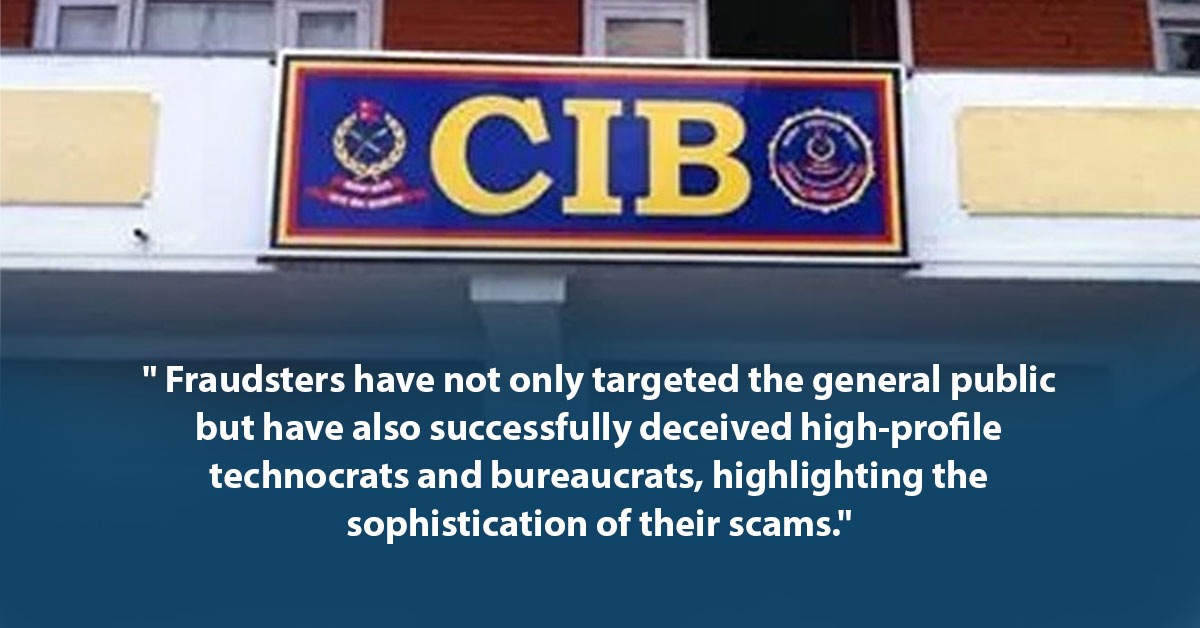

Are you receiving enticing messages from unknown numbers? Have you received messages offering financial benefits or job opportunities? Stay alert—you might be the next target of a cyber scam.
Few days ago, a former Senior Superintendent of Police (SSP) received a phone call. The caller claimed to be the head of eSewa company and was offering him a bonus of Rs. 9,000. Trusting the caller, the SSP provided his bank details without hesitation. Shortly afterward, he received a message notifying him that Rs. 150,000 had been deducted from his bank account. Following the incident, he filed a complaint with the Central Investigation Bureau (CIB), and an investigation is currently underway.
Similarly, an incumbent Joint Secretary fell victim to a scam while attempting to purchase a saree online. The fraudster offered to send Rs. 5,000 upfront, with the remaining amount to be paid via cash on delivery. Once the payment was confirmed, the website disappeared without leaving a trace.
Fraudsters have not only targeted the general public but have also successfully deceived high-profile technocrats and bureaucrats, highlighting the sophistication of their scams. The CIB and Cyber Bureau of the Nepal Police have been inundated with applications related to online financial scams. Both bureaus have urged the public to remain vigilant and act wisely to avoid falling victim to such scams. We have been receiving an overwhelming number of applications related to online scams. Fraudsters always seem to be one step ahead of investigative institutions. The number of cases involving people falling victim to these scams is increasing every day,” said SP Hobindra Bogati, spokesperson for the CIB.
Likewise, the spokesperson for the Cyber Bureau, DSP Deepak Raj Awasthi, urged the public to remain vigilant and act wisely. “Simply owning a smartphone does not make someone smart. Before falling for any temptation, think twice and make informed decisions,” he said.
The Central Investigation Bureau (CIB) has reported that over 500 numbers are actively involved in cyber phishing in Nepal. The Nepal Police Authority, responsible for investigating financial fraud, has urged the public to stay alert and take necessary precautions to protect themselves from such scams.
CIB stated that scammers have been posing as officials from fintech companies like esewa, Khalti and IME pay. They have also worked on the company’s logo to make their fraud look legitimate. Common tactics include repeatedly entering incorrect passwords on personal accounts to temporarily lock them and then calling the user, claiming there is an issue with their account. They ask for OTP numbers and subsequently steal funds. The press release also highlighted various scams being carried out under the guise of online trade.
Recent incidents include fraud cases involving NPR 5.7 million in Pokhara, NPR 1.6 million in Chitwan, and NPR 550,000 from a government employee, among others, amounting to millions of rupees in losses.
Cyber Bureau Probing Rs. 50 Crore Online Fraud
The Cyber Bureau is investigating online fraud cases worth Rs. 50 crores. It has a record of recovering Rs. 45 lakhs on a week, which is being returned to the victims. However, the number of cases continues to rise daily. The investigation process is slow due to lengthy procedures and a lack of manpower, causing delays in promptly addressing victims’ claims. ‘Young individuals are increasingly involved in such crimes, using their accounts for small financial gains to benefit scammers. “Due to technical challenges, we have been unable to trace the main scammers. The amounts we have recovered so far are through local agents, who were used as intermediaries to transfer money to the scammers,” said DSP Awasthi.
DSP Awasthi emphasized the importance of the public understanding that renting out their bank details constitutes a financial crime. “Personal accounts are meant for personal use, and account holders will be held accountable for any suspicious transactions. People must understand that renting out or using their account for others’ purposes is itself a financial crime,” said Awasthi.
Fraudsters have been able to lure individuals with access to Nepali bank accounts. According to Awasthi, If people stop renting out their accounts or acting as intermediaries for scammers, such crimes would not occur. “The scammers are foreigners, and we are unable to trace them due to technical challenges. The amounts we are recovering are from Nepalese themselves. If people stop using their bank accounts to facilitate such crimes, these incidents would not occur,” he said.
Measures to take if you are victimized
According to Awasthi, many people fall victim to scams through Telegram. Taking advantage of the app’s privacy features, fraudsters redirect individuals from Facebook, Instagram, or WhatsApp to Telegram. Once there, they engage in one-way communication and set a trap of temptation.
In case of falling victim to such scams, Awasthi urged the public to report immediately. He mentioned that people can file a complaint at nearby police stations, the Cyber Bureau, or the crime division. When submitting the complaint, they must provide the bank details where the transfer was made. Once the complaint is registered, the police will block the account, and the search for the account holder will begin. However, the process can be quite lengthy. “After retrieving the account holder’s details, we will start the search using the KYC information. We may need to coordinate with local police officials, which can make the search process even longer,” he said.
The Cyber Bureau has requested the public to follow preventive measures to avoid falling victim to scams. “We may not be able to recover all the money. If the public takes preventive steps, fraudulent activities will be prevented. We urge everyone to be smart and not give in to temptation too easily. Think twice before falling into the trap,” they said.
The Cyber Bureau is dedicated to ensuring the country’s financial security. Therefore, it has urged victims to report any incidents to the police immediately and to make those around them aware of any fraudulent activities.